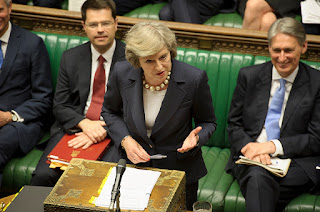It would be an understatement to say the government has had a bad year; there's still room for things to get even worse before Christmas.
There was a time in the aftermath of the 2015 general election when the Tories appeared unassailable. They had finally broken the curse of the wilderness era and managed to win a majority of seats (albeit a narrow majority). Cameron was riding high in a warm spell of rising real wages. Inflation was at its lowest levels since 1960, when another old Etonian had occupied Number 10, Harold Macmillan (or "Supermac" as the press dubbed him).
Events in the last twelve months have broken this cosy picture asunder. Wages have been falling following the Brexit inflation spike. The economy is still growing but this is more down to the quick-response policies of the Bank of England in the aftermath of the EU referendum. The Pound in our pockets is just what it once was, especially after the referendum. It's gained 9 cents against the Dollar since the October 2016 trough so it's not plumbing the depths right now but millions of Brits have felt their money falling that bit shorter abroad since June 2016.
With this prolonged spell of falling real wages in mind, it's no wonder the snap election was such a disaster if you really think about it. The feel-good factor in May 2015 was long-gone and a new mood of uncertainty has crept in. In place of optimism, the British right-wing allowed itself to adopt a defensive and prickly demeanour.
The left initially seemed too busy being at war with itself to notice but once Mr Corbyn had cemented his place as Labour leader in the summer of 2016, things seemed more set-in-place. The sections of the press in May's favour spoke of crushing the saboteurs. Judges were dubbed "enemies of the people" and untruths of the referendum campaign (£350m a week et al) suddenly dropped off the headlines. Brexiteers have viewed any moves to scrutinise the Brexit process as sabotage.
The failure to clinch victory in June 2017 served as a shock to the Tory party's nervous system. The populist tide that ensured a Leave victory and Trump's ascent to the White House has now gridlocked the British political system. Discontent has since started to bubble inside the Tory party, to the point where even the Foreign Secretary seems to feel bold enough to dictate the terms of Brexit in a leaked memo to Mrs May.
It's impossible to speculate on just how many Tory MPs wish Mrs May to stand down. 15% of Tory MPs (48 as of 8th June) are required to hand in a letter to the 1922 Committee chair to trigger no confidence proceedings. Only the committee chair knows exactly how many letters are on file. However, the Daily Mail reports that as many as 40 MPs may be prepared to do so.
Looming budget to heap the pressure on Downing Street
At the point where the government is in desperate need of respite, the clock is ticking down to the next major hurdle: the autumn budget is unveiled in ten days. Following a grim assessment on the state of the UK's productivity by the Office of Budget Responsibility, it would be reasonable to expect to see a downgrading of UK growth forecasts and a worsening fiscal picture.
Weak wage growth feeds into lower tax revenues. Weaker-than-previously-expected productivity in the future will likely make the UK's national debt a greater burden as a proportion of GDP. Fiscal hawk Brexiteers expecting some kind of Brexit budgetary dividend are setting themselves up for a grand disappointment.
With interest rates finally seeming to be on the rise again, the economy could soften from here. Rates typically rise to encourage saving instead of borrowing. Consumer spending may wane as households tighten belts. Mrs May and Chancellor Phillip Hammond will have to make even harder choices with a paper-thin grasp on control in Parliament as the economy possibly begins to slow.
The government might be inclined to raise taxes and try and keep the public finances lean in the event of weaker growth. A potential rise in diesel duty has been reported in recent days. It might be pursued promote greener sources of energy. History may start to repeat itself in an economic sense with fatal consequences for the governent. In 1987, the Tories were riding high as the economy boomed after tax cuts and almost a decade of Thatcherism.
Within a year, things got out of hand. Rising inflation by the summer of 1988 pushed Thatcher into a corner and the government responded by hiking interest rates as a knee-jerk reaction. This caused the economy to enter a soft landing; growth slowed, discontent grew and the feel-good-factor was gone. The government began losing its way, introducing toxic policies such as the Poll Tax, one of the most unpopular taxes in British history. Rate hikes in 1988 had the effect of deflating a housing bubble that had developed during the Thatcher era. The Gulf War oil shock of 1990 was the final straw that broke the weak economy's back, sending the UK into a full-blown recession.
The Tories find themselves trapped in a corner again. The economy is likely to soften from here, so any shock could spell trouble. A new election before 2022 will simply compound the sense of electoral fatigue in the country. The Tories might be inclined to wait and see, in the hope that the situation magically rights itself. Unless the UK undergoes a productivity miracle, that remains an increasingly distant chance.

No comments:
Post a Comment